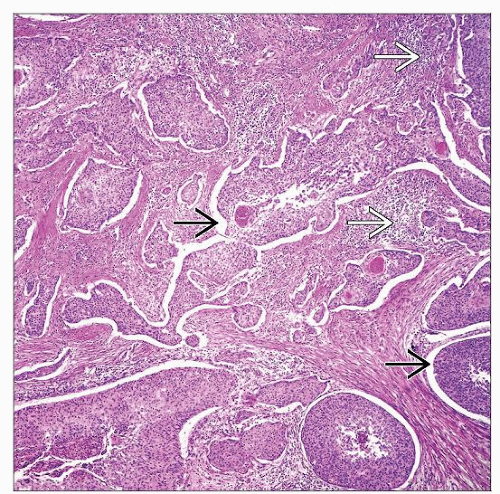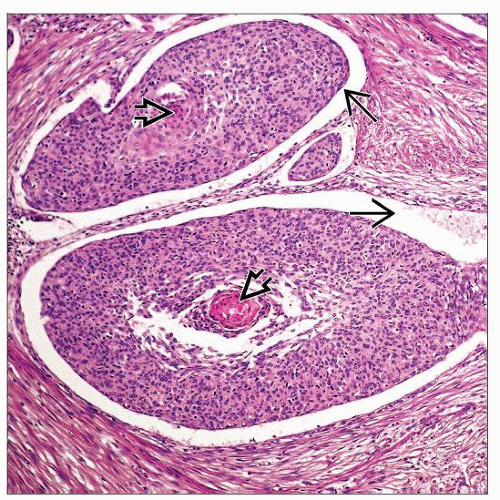Basaloid Carcinoma
Antonio L. Cubilla, MD
Alcides Chaux, MD
Elsa F. Velazquez, MD
Key Facts
Etiology/Pathogenesis
HPV is detected in most cases
Serotype 16 is most common
Clinical Issues
Represents 10-14% of all penile SCC
Up to 2/3 of patients have positive inguinal nodes at diagnosis
Macroscopic Features
Usually affecting the glans
Vertical growth pattern
Deeply invasive into deep anatomical structures
Microscopic Pathology
Closely packed nests of basaloid cells
Central necrosis and keratin debris
Focal and abrupt central keratinization
Peripheral clefting between tumor nests and stroma
Peripheral palisading is inconspicuous
Scant intervening stroma
Tumoral cells show high nuclear:cytoplasmic ratio
Numerous mitoses and prominent apoptosis
Sometimes “starry sky” pattern
Spindle and pleomorphic cells in some cases
PeIN of basaloid type frequently found in adjacent areas
Top Differential Diagnoses
Usual type of SCC with a nesting pattern
Warty/basaloid carcinoma
Urothelial carcinoma of distal urethra
Cutaneous basal cell carcinoma
Small cell neuroendocrine carcinoma
TERMINOLOGY
Synonyms
Basaloid squamous cell carcinoma (SCC)
Definitions
Aggressive variant of nonkeratinizing SCC composed of small to intermediate-sized basaloid cells
ETIOLOGY/PATHOGENESIS
Infectious Agents
Most cases are associated with human papillomavirus (HPV)
Serotype 16 is most common
CLINICAL ISSUES
Epidemiology
Incidence
10-14% of all penile SCC
Age
Average = 52-54 years at presentation
Presentation
Large, ulcerated, nonexophytic mass
1/2 to 2/3 of patients have positive inguinal nodes at diagnosis
Treatment
Surgical approaches
Deep tumors are treated with total penectomy and bilateral groin dissection
Tumors confined to superficial corpus spongiosum may be treated with partial penectomy
Adjuvant therapy
Chemotherapy for advanced cases
Radiation
Selected cases with superficial erectile tissue invasion
Prognosis
Local recurrence seen in 1/3 of cases
Regional metastases present in > 1/2 of patients
High cancer-specific mortality
MACROSCOPIC FEATURES
Stay updated, free articles. Join our Telegram channel

Full access? Get Clinical Tree








